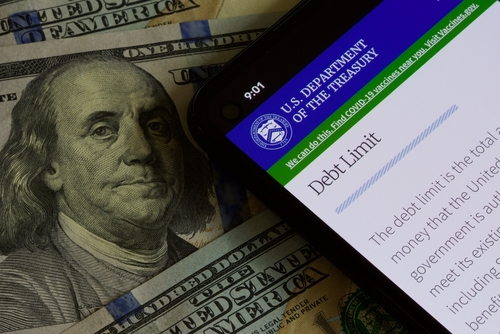Biden administration officials debate constitutional challenge to debt limit

Image from Shutterstock.
Officials in the Biden administration are debating a challenge to the debt limit that is based on the 14th Amendment’s public debt clause.
The option was “deemed unthinkable” by previous administrations, but the theory is now the subject of “intense and unresolved debate,” the New York Times reports via How Appealing. The story is based on anonymous sources.
The statutory debt limit is currently set at $31.4 trillion. Unless Congress intervenes, the United States will run out of money as soon as June 1, according to Janet Yellen, secretary of the U.S. Department of the Treasury.
The public debt clause is at Section 4 of the 14th Amendment. It reads: “The validity of the public debt of the United States, authorized by law, including debts incurred for payment of pensions and bounties for services in suppressing insurrection or rebellion, shall not be questioned.”
Legal scholars differ on the constitutionality of the debt limit, according to the New York Times.
“Here’s the argument,” wrote Garrett Epps, a professor at the University of Oregon School of Law, in the Washington Monthly in November 2022. “The Constitution’s text bars the federal government from defaulting on the debt—even a little, even for a short while. There’s a case to be made that if Congress decides to default on the debt, the president has the power and the obligation to pay it without congressional permission, even if that requires borrowing more money to do so. The result would be a constitutional crisis—Article I is pretty clear that borrowing and repaying indebtedness are congressional, not executive, powers—but a constitutional showdown may be preferable to an economic collapse.”
The government could be exposing itself to lawsuits after a default—no matter what decision it makes.
If the government defaults on its obligations, it could be sued by anyone who isn’t paid on time. A legal challenge would also be likely if the government ignores the borrowing limit. That challenge “would most likely rise quickly to the Supreme Court,” according to the New York Times.
See also:
ABAJournal.com: “Is debt limit unconstitutional? Answer is yes, some argue, based on the 14th Amendment’s public debt clause”
Write a letter to the editor, share a story tip or update, or report an error.



